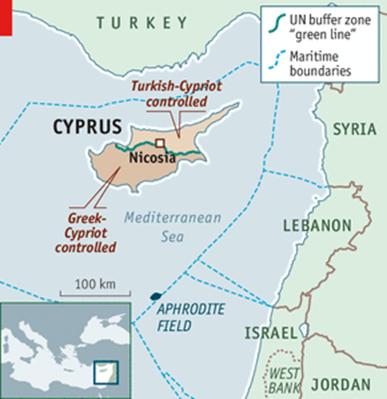The future of bankrupt Cyprus and perhaps of the EU’s vast energy needs lies in the offshore gas field named after the ancient Greek goddess Aphrodite who, according to legend, was born on the tiny island nation.
The Aphrodite field, one of 12 blocks, alone could supply up to 40% of the EU’s current natural-gas consumption. The block, moreover, is close to Israel’s Leviathan gas field –the very name suggests how much energy it might contain–. According to the US Geological Survey, an estimated 122 trillion cubic feet of recoverable natural gas lie, along with 1.7 billion barrels of recoverable oil, beneath the seabed of the Levant Basin, about as much as the world consumes in a year (see the map). Gas from Israel’s smaller offshore Tamar field began flowing into the country on 31 March.

While the Greek Cypriot economy goes into meltdown (it could shrink by as much as 15% this year and the unemployment rate reach Spanish proportions), as a result of the collapse of its oversized banking sector (around seven times the annual GDP and much favoured by wealthy Russians wishing to salt away funds in the tax haven), the spotlight is now cast on the potential of the energy wealth in Cypriot waters. The vast reserves could ‘save’ not just the island in the long term (exports are not envisaged until 2019), but also make a huge contribution to the EU’s energy needs and reduce reliance on Russia. Half of EU countries’ energy supplies are imported.
The issue, however, is complex and not just simply one of extracting the gas and exporting it. Cyprus has been divided since Turkey invaded it in 1974 after attempts were made to unite the island with Greece. Since then Turkish troops have occupied the northern one-third of the country in the self-proclaimed Turkish Republic of Northern Cyprus (TRNC), which no other country recognises. Turkey disputes the right of the internationally-recognised Greek Cypriot government in the south of the island to exploit the energy wealth.
The whole of Cyprus joined the EU in 2004 (the acquis communautaire only applies to the Greek Cypriot part). Turkey has been negotiating its EU accession at a snail’s pace since for the past seven years. Roughly one-half of the 35 chapters of EU law that Turkey has to comply with have been suspended by the EU as whole because Ankara refuses to open its ports and airports to Greek Cypriot traffic and so recognise the Republic of Cyprus unless something is done to ease the isolation of the TRNC, or are blocked by France and Cyprus individually.
Noble Energy of Texas announced a major discovery at the end of 2011 in the exclusive economic zone of the Republic of Cyprus (with a 60% probability of geological success) after defying Turkish demands to stop drilling.
Ankara claims that sections of some of the blocks ‘overlap with Turkey’s continental shelf areas in the Eastern Mediterranean’. It resorted to gunboat diplomacy and sent ships and submarines to the area and threatened to provide naval escorts for survey vessels of the Turkish Petroleum Corporation exploring off the coast of northern Cyprus.
Nicosia says these claims are ‘legally unfounded and geomorphologically baseless’ and it put out to tender drilling in some of the blocks.
The Cypriot and Israeli governments have an agreement delimiting the maritime boundary between the two countries, as well as defence and cooperation agreements. These accords came after Turkey’s relations with Israel reached a low point in May 2010, following the Israeli raid on a Turkish-flagged aid flotilla seeking to break the Gaza blockade, in which nine Turks died. Recep Tayyip Erdogan, Turkey’s Prime Minister, is a vociferous supporter of the Palestinian cause. Ankara downgraded diplomatic relations with Israel to below the level of ambassador and restricted use of Turkey’s air space to Israeli cargo flights.
In a surprise move last month, Turkey and Israel began to patch up their relations after the Israeli Prime Minister, Benjamin Netanyahu, in a phone call stage-managed by the US President Barack Obama, bowed to Erdogan’s demand and apologised for the deaths. The rapprochement should be seen in the context of the deteriorating crisis in Syria and the need for both countries to work together to contain it (both Turkey and Israel have borders with Syria), but it could also be a game-changer for the region’s energy politics.
The detente between Israel and Turkey could facilitate the export of Israeli gas to and through Turkey, while piping Cypriot gas to Turkey, instead of building a costly liquefied natural gas plant in Cyprus, for which Nicosia on its own does not have the money, looks like the best solution. Turkey (at the nearest point around 100km from Cyprus) is the most easily accessible market for Cypriot gas.
Turkey (population 74 million), which does not have any gas or oil of its own, is becoming an energy hub for Europe. The 1,092-mile Baku-Tbilisi-Ceyhan pipeline traverses 669 miles of Turkish territory to ship Azeri Caspian oil to Turkey’s Mediterranean Ceyhan port. Construction of the 3,900km EU-backed Nabucco pipeline, repeatedly delayed because of cost overruns and problems in nailing down supply deals, which will link the gas-rich Caucasus and Central Asia to energy-hungry European nations, is envisaged to start this year.
Bringing the Cypriot gas to market will be politically and technically difficult, however. A pipeline to Turkey is unthinkable without a mutually satisfactory solution to the island’s division. Greek Cypriots massively rejected in a referendum in 2004 the reunification plan of Kofi Annan, the former UN Secretary General, while Turkish Cypriots overwhelmingly accepted it. Since then little progress has been made in one of the world’s most intractable problems.
Nicos Anastasiades, the embattled President of Cyprus, was the only prominent politician to vote in favour of the plan when he was head of the conservative Democratic Rally party. Greek Cypriots, however, are seething with anger at the demise of the banking sector, the mainstay of the economy along with tourism, and are in no mood to strike a deal with Turkish Cypriots.
Ankara, meanwhile, has wasted no time in exploiting Cyprus’s crisis, as it sees the Greek Cypriots boxed into a corner. No sooner was a deal reached between Nicosia and the troika than Ankara announced it would freeze out energy companies that cooperated with the Greek Cypriot government over offshore gas. Taner Yildiz, Turkey’s Energy Minister, said Eni, the Italian energy giant, would be barred from current and future projects in Turkey if it went ahead with a licence it won in January to explore gas off the Cyprus coast. French, South Korean and US companies have also been awarded exploration licences.
The Turkish Foreign Minister Ahmet Davutoglu has proposed three alternatives to end the stalemate in Cyprus, all involving the exploitation of natural gas around the island. He said the two communities could form a united Cyprus state and jointly exploit the natural resources around the island, or, in parallel to ongoing peace negotiations, Greek Cypriots and Turkish Cypriots could form a joint committee to exploit and market natural gas. The third option is a two-state solution.
Whether Cyprus’s crisis produces a more pragmatic approach to reunification remains to be seen. Unless Ankara decides to be magnanimous, which is unlikely in the present circumstances, a conciliatory gesture would have to come from Nicosia. Perhaps it will be inspired by Aphrodite, the goddess of love.



